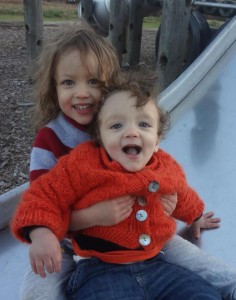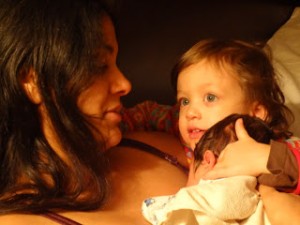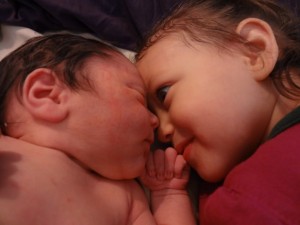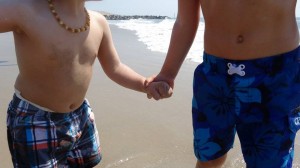Should Children Say Sorry: Siblings, Hitting and Forgiveness
Here’s what I’ve decided: Parents who wish to make space for true compassion, empathy and kindness, especially between siblings, will stop making their kids say sorry.
It seems there’s plenty out there on why not to say sorry, although I keep seeing people making their kid say sorry and feeling upset when their kid doesn’t want to. I’m talking about getting to the deeper aspects behind “I’m Sorry”, right to the root of the issue. Beyond wanting to move towards needs-based connection of Nonviolent Communication (NVC), I have been exploring the underpinnings of manners, compassion and kindness.
I am in the middle of a 30 Day Gratitude Journey with my friend Xandra. (Do you know Xandra O’Neill of Womb to Wellness? She did that intriguing call last week that I missed: The Importance of Preparing for Your Baby Now? Well she is doing a 30-Day Gratitude Journey and will again, I am sure.) Now, Xandra is a skilled preconception, fertility and pregnancy expert, so she knows how to lead people to fertile ground for whatever they are birthing in their lives. I knew this. What I did not know was how simple, profound and powerful a gratitude practice can be, even when you’re like me and need effort to build systems that work.
“But, Sheila, how does this relate to making kids say sorry?” you ask.
Well, Xandra’s guidance energized the thinking I’ve been doing about forgiveness.
I have been doing a lot of internal shifting. For some time now, I’ve been rooting out old beliefs that aren’t mine (that lead to parenting and personal behaviors I do not believe in). I have been creating space to nurture life and planting my own seeds of value to cultivate.
Here’s what I now know about saying sorry and the “manners” we wish kids to have: It’s all about forgiveness.
From my years of experience teaching in nursery school through high school and community college as well as parenting my own children and supporting other parents through A Living Family and my work and all my own personal experience….
For most people/parents, saying sorry is directed at getting the other person’s forgiveness. Whether we are conscious of this or not, this is the desired intention, especially if there’s been some toddler altercation.
“I’m sorry. I forgive you. (It’s ok.)”
That is the complete cycle that people seem to usually be going for.
Forgiveness, as we all know, is more elusive than words.
Forgiveness is a feeling. And we know when we feel that tightness, the thought that jumps up unbidden, the subtle tension between people that we have not fully forgiven. Will we ever truly, deeply, fully let it go? Will this spot be sore forever?
One thing about forgiveness: When it comes to mistakes, forgiving other people is easier than forgiving ourselves.
That’s because forgiving ourselves gets to the heart of the issue, the source of the behaviors and feelings painfully popping up in the present. The actions of the past do not hurt us in the present moment as much as way we internalize negative self-talk and disconnected relationship with ourselves. The hurtful, scary or anxious thoughts we hold about ourselves and our world are painful to us.
How many times have you called yourself “idiot?” “Stupid.” “Fool.”
Label. Blame. Shame. Guilt. Punish….
“What is wrong with me?”
And then those very words come, unbidden, to mind with others in our lives in the heated moments…“What is wrong with you?”
Those kinds of thoughts or words don’t help anyone, yet as I mentioned we are wired with these behaviors.
What I’ve been thinking about, as I navigate sibling relationships is this: Are we doing harm to relationships by expecting and then enforcing apologies?
Are we actually helping like we think we are?
Parents are told to “teach their kids right from wrong.” This includes manners for most parents. Young children are taught that they “must say sorry” when they hurt someone or “hurt someone’s feelings.” When this happens, when we start in with anxious energy around sharing and sorry, parents force our children to focus on the other person and their hurt when their child is already feeling disconnected and can’t think in the first place.
My daughter has moments of internal intensity and sometimes hits her brother.
If I tell her she is wrong or something is wrong with her, if I yell or get angry and hard with my words and tone, she gets caught up in “wrongness.” Already disconnected, she disconnects from any compassion she may have felt and makes an attempt at self-preservation from this pain. Even adults, feeling the sting of criticism in these moments, move towards defensiveness or counterattack.
If, however, I allow the focus to back up to and hold the bigger picture for my child, I make the space for her to follow her natural instincts toward compassion, kindness and empathy. I can do this by making observations without evaluations, NVC (Nonviolent Communication) style. I can do this by connecting to feelings and needs going on within me, her or her brother.
When I use the tools I have in NVC and Parenting by Connection, I create a safe space for my child to forgive herself.
Many siblings have exhibited “aggressive” behavior towards her brother. They have hit, pushed, kicked, stepped on, tackled, poked, scratched, scraped, dragged, and pulled at each other. Sometimes these are things they like, and other times there are big hurts and hurt feelings. I don’t want my daughter to come away with a label or feeling of being unlovable, bully, aggressive, bad, wrong.
I want her to feel ok being human, just like I want to feel ok making mistakes.
Recently,when I create this forgiving and loving space for her, my older child has shifted her choices when she hurts her brother through her play or her off track behavior.
I noticed that the more I focus on observations and empathizing with her feelings and needs, the more she has started to connect to herself. She seemed relieved to know I was an emotional anchor of love. She needed to know that I was ok with her learning to make other choices.
In addition to Staylistening and my use of other tools, I started to more consciously talk with her in a quiet, close, connected and gentle way after an outburst. (Are you willing to treat him gently, safely, respectfully, kindly?) She has begun to identify her feelings and tell me her needs. (Are you feeling…? What are you needing?)
Lately, when I do this, usually she will stop, say “Sorry!” to her brother and do a 180 where she finds her own way to include him or love him or bring him joy.
Once in a while I will suggest something that might help connect with her brother if I see from her body language she is shifting towards connection but can’t find a behavior to settle on. Sometimes she will still do something like hug him more roughly than I would like. That’s my signal that she’s running on empty, and I need to get out some of my parenting power tools and build more connection and cooperation into our relationship.
Certainly, we are still working on it. She will sometimes run away when she did something, she might say something else happened than what did or that she didn’t do anything or that he did it to himself. We even more recently had an incredibly connected and clearly helpful conversation where she shared with me that she goes away to breathe and calm down. We discussed setting up a calm down corner or a calm down basket for her and the whole family. She has, on her own, been going to a private space in whatever room we are in to breathe when she has hit him, and we are working on moving that up to before she hits him.
Sibling squabbles will happen.
I am ok with that learning curve because they have a unique and powerful opportunity to explore safe boundaries, personal voice, and full human expression and identity. I would love for them to feel safe connecting deeply with each other physically, emotionally, and mentally. I believe nurturing the natural compassion in each of them in these ways will allow them to feel trust, connection and safety with each other that encourages taking risks, loving deeply, and giving support.
If we want children to be kind, have manners and “say sorry,” my belief is that we would choose to help our kids in a way that nurtures self-kindness, self-forgiveness and self-love.

Children given space to come to “I’m sorry” through their own path of connection and forgiveness care compassionately for others…and isn’t that the goal?
It is through this forgiveness that the seed of compassion is watered and flowers most brightly. This is where the true sentiment behind “I’m Sorry” sprouts. When each emotion and action must come through us, we do well to cultivate a heart that looks both within and without with compassion. The more we have experienced these things for ourselves from ourselves the greater capacity we have to make authentically caring connections, give loving kindness, make true apologies of action and use the power of forgiveness to cultivate thriving relationships and vibrant life.
This is what we truly want for our children. This goes way beyond rote repetition of lines our parents and teachers told us or got us to say. This is real. This is full and integrated, creative and flexible, loving and in the moment.




